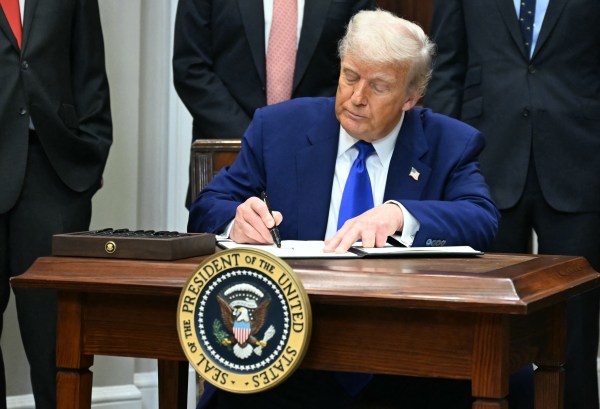Hello and happy Saturday. I still remember the conundrum I faced the night of the debate between President Joe Biden and Donald Trump last June. Cancel some plans I made with friends and stay home and watch, or go ahead and go out? “I’ll just record it,” I told myself. “It’s not like debates ever matter.” Ahem. I did watch when I got home, and after a few minutes my husband and I were asking each other, “Is this real? What is going on?”
We all know what happened after that. Biden—reluctantly—dropped out of the race in July, and Vice President Kamala Harris took his place on the Democratic ticket. But a new book out this week explores what happened in the months and years leading up to the fateful debate. Original Sin: President Biden’s Decline, Its Cover-Up, and His Disastrous Choice to Run Again, by Jake Tapper and Alex Thompson, traces a path through Biden’s 2020 campaign, his decision in 2022 to seek reelection, and the events that prompted him to step aside. I’m only partway through it, but the book paints a devastating picture, revealing that Biden struggled cognitively at times even during the 2020 campaign and detailing how family members and close advisers sought to hide or explain away Biden’s decline.
Steve Hayes reviewed the book this week, focusing on the section discussing special counsel Robert Hur. Hur had investigated Biden’s alleged mishandling of classified information and in February 2024 released a report recommending against prosecution. He explained that a jury would likely view the president as a “sympathetic, well-meaning, elderly man with a poor memory.” Hur faced intense backlash from Democrats—and the mainstream media. Steve notes that while there was coverage questioning Biden’s fitness—he points to a June 2024 Wall Street Journal investigation—the media bears some of the burden for hiding Biden’s decline and for castigating those, like Hur, who were truthful about it.
The media failure went beyond sins of omission to sins of commission, too. Perceptions of Biden’s struggles were explained away in reported pieces as the result of misleading “cheap fakes” or downplayed as problems anyone might have. Biden partisans denigrated anyone who raised concerns. The attack on Robert Hur from Jennifer Rubin, then a Washington Post columnist, was typical. “But it was Hur’s gratuitous smear about Biden’s age and memory—most egregiously, his far-fetched allegation that Biden could not recall the date of his son Beau’s death—that transformed a snide report into a political screed,” Rubin wrote. (In fact, Hur’s claim about Biden’s memory was not at all gratuitous, his allegation that Biden didn’t recall the dates of Beau’s death was accurate, and his report was neither snide nor a political screed.)
In his Tuesday column, Michael Warren asked, “Where does Robert Hur go to get his reputation back?” Michael points out that, contrary to accusations from Democrats that Hur was trying to help Republicans, the special counsel was obligated to explain why he wasn’t recommending charges. He wrote: “This aspect of the report was not merely the fulfillment of the special prosecutor’s duty but a red flag for anyone still in denial about the bigger truth: Biden was an octogenarian who had clearly declined while holding one of the most stressful and high-pressure jobs in the world.”
Regarding Michael’s question as to where Hur should go to reclaim his reputation, one answer is: not Capitol Hill. This week John McCormack asked several Democrats who had been critical of Hur at the time if they’d had a change of heart. Sens. Tina Smith and Tim Kaine told John that Biden had been fine—”fantastic,” Kaine said—in their limited interactions with him and expressed no regrets about their comments. Sen. Sheldon Whitehouse told John, “Whether [Hur is] telling the truth or not, there are things prosecutors don’t get to say.”
Nick Catoggio has written extensively about Donald Trump’s efforts to overturn the 2020 election, and he wrote the cover-up around Biden’s decline is tantamount to a coup—a very different kind of coup than Trump attempted, but a coup nonetheless.
Healthy Joe Biden was on the ballot but Infirm Joe Biden would have replaced him in office. It wasn’t a traditional coup attempt of the “bludgeoning cops with flagpoles at the Capitol” variety, but it was a willful ploy to rig an election by deliberately misrepresenting the stakes.
And it succeeded. Unlike Trump’s coup attempt, Biden’s worked—at least until the presidential campaign began in earnest.
The book release and ensuing recrimination took some attention away from the Trump administration, but not entirely. Elsewhere on the site, David M. Drucker reported on how the U.S. Chamber of Commerce and other groups are trying to work with the administration on tariffs, Nick wrote about whether Trump will abandon efforts to end the war in Ukraine, and Adam White explained why the administration is facing so many nationwide injunctions in response to executive orders. Thanks for reading.

Killing Them Softly

The Limits of Bribery

Nationwide Injunctions vs. Nationwide Executive Orders
Best of the Rest

The Empty Ecstasy of Digital Crowds

Separating Snake Oil From Science

The Oval Office Bully Pulpit

Memecoin Dinner Offers Foreign, Anonymous Donors Access to Trump

Temptation as a Public Policy Problem




You’re Wrong About Originalism











Please note that we at The Dispatch hold ourselves, our work, and our commenters to a higher standard than other places on the internet. We welcome comments that foster genuine debate or discussion—including comments critical of us or our work—but responses that include ad hominem attacks on fellow Dispatch members or are intended to stoke fear and anger may be moderated.
With your membership, you only have the ability to comment on The Morning Dispatch articles. Consider upgrading to join the conversation everywhere.